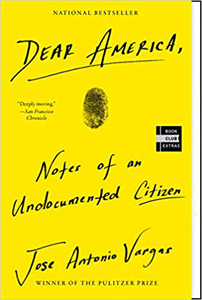 Jose Antonio Vargas, Dear America, Notes of an Undocumented Citizen (New York: Dey Street Books, 2018), 256pp.
Jose Antonio Vargas, Dear America, Notes of an Undocumented Citizen (New York: Dey Street Books, 2018), 256pp.
A review by Beth Thomsen Kawasaki. Beth is a graduate of Seattle Pacific University and Fuller Theological Seminary. She lives and works in California.
“I do not know where I will be when you read this book. As I write this, a set of creased and folded papers sits on my desk, ten pages in all, issued to me by the Department of Homeland Security. 'Warrant for Arrest of Alien,' reads the top right corner of the first page.”
So starts Jose Antonio Vargas’ best-selling memoir. Vargas, who Bill O’Reilly once described as “the most famous illegal in America,” is a Pulitzer prize-winning journalist, Emmy-nominated filmmaker, Tony-nominated producer, and founder of Define American, a nonprofit and culture organization, named one the World's Most Innovative Companies by Fast Company.
According to the US government, he’s “illegal.” How does this happen?
“Most Americans, I (Vargas) discovered, have no idea how the immigration system works, what the citizenship process requires, and how difficult, if not downright impossible, it is for undocumented people to 'get legal.' All the while, undocumented workers like me pay billions (approximately $21 billion a year in payroll, Social Security, and Medicare) into a government that detains and deports us.”
When he was twelve-years-old in 1993, the Filipino Jose — that's with no accent mark because American typewriters didn’t have that key when the U.S. claimed the Philippines for its own in 1899, was sent to the U.S. by his mother. He lived with his grandparents, both naturalized U.S. citizens, in Mountain View, CA. Their home was less than two miles from a startup named Google and near Stanford University. “But my family is from the other Mountain View," writes Vargas, "which is part of the other Silicon Valley.”
At sixteen, Jose, a driven-to-fit-in and high achieving student at Mountain View High School, bikes to the DMV to get his Driver’s Permit, because that’s what you do when you’re sixteen in America. He discovers that his green card is “a fake.” His head and life explode.
After confronting his self-sacrificing, patriotic, and now shamed grandparents, he learns that he didn’t fly to America via his “uncle,” but with a coyote to whom they paid $4500. An enormous amount for his Lolo (grandfather), who earned $5.00/hour as a security guard. He also learns his future faces severe limits, by U.S. law, and so he starts a new course of “lying, passing, and hiding.”
Yet this is not “a book about the politics of immigration… this is a book about homelessness.”
Vargas, who despite success and fame still lives the fragile life of an undocumented citizen, invites us deep into his displaced identity as an “illegal” teen, college student, employee, and human rights leader. He introduces us to the select group of supportive people he risks sharing his story with and to those who oppose him, for many different reasons. He reveals how he navigates a federal and local system set up to “out,” diminish, and deport him. We accompany him, pre-and-post coming out, as he chooses the path of “radical transparency,” in his groundbreaking essay, “My Life as an Undocumented Citizen,” published in The New York Times Magazine in 2011, which was the same day Obama introduced DACA, the Deferred Action for Childhood Arrivals program.
However one feels about immigration, one cannot help but admire Vargas’ intelligence, resilience, contributions, and patriotism. He is thoroughly American. Just not a citizen.
Whatever one’s politics, one cannot help but be baffled by the lack of long-range vision and commitment to all-partisan problem-solving by those charged with doing so.
As DACA, a program Vargas was ineligible for by four months, lands in the Supreme Court as I write, I encourage readers to get educated. This book is a very worthy way. And I pray for wisdom, clarity, and kindness as nine people, descendants of immigrants, make decisions that will influence the future of 700,000 other immigrants who came to the United States as children.


